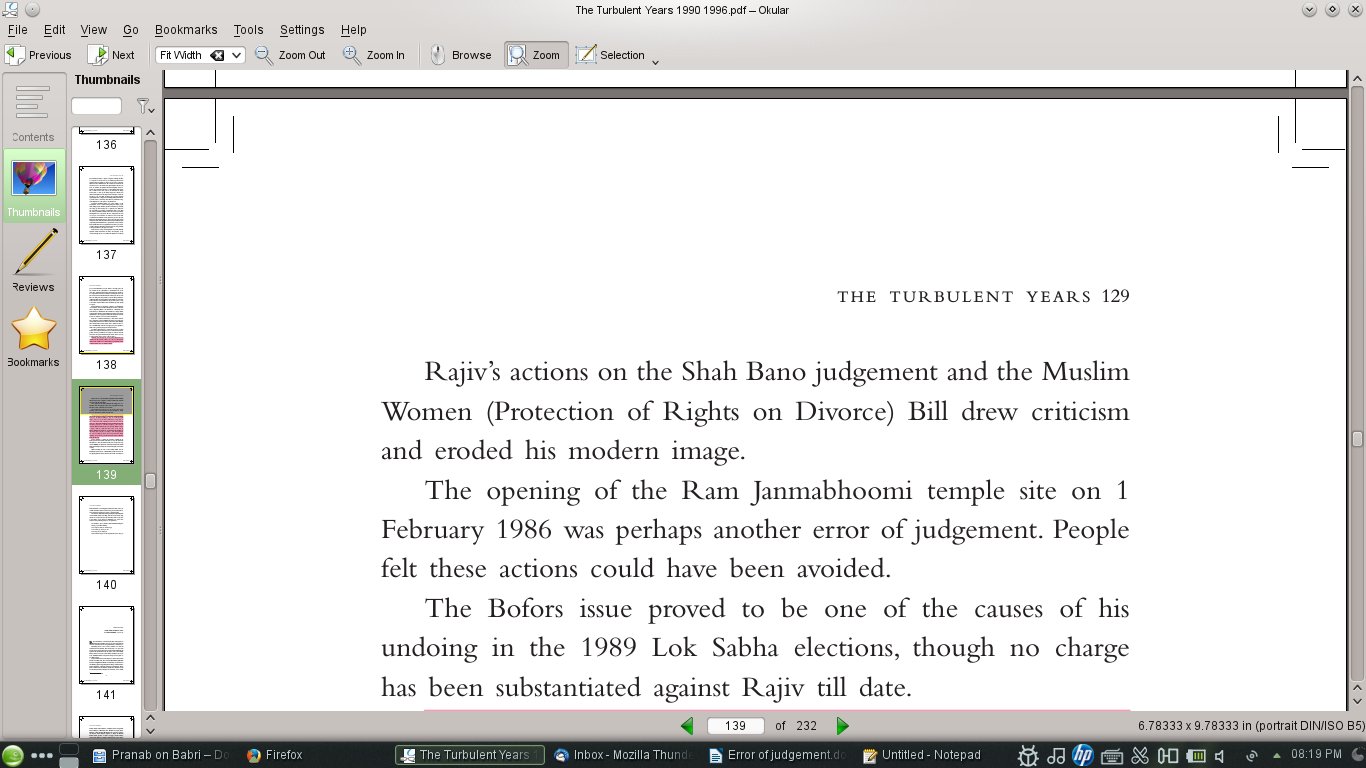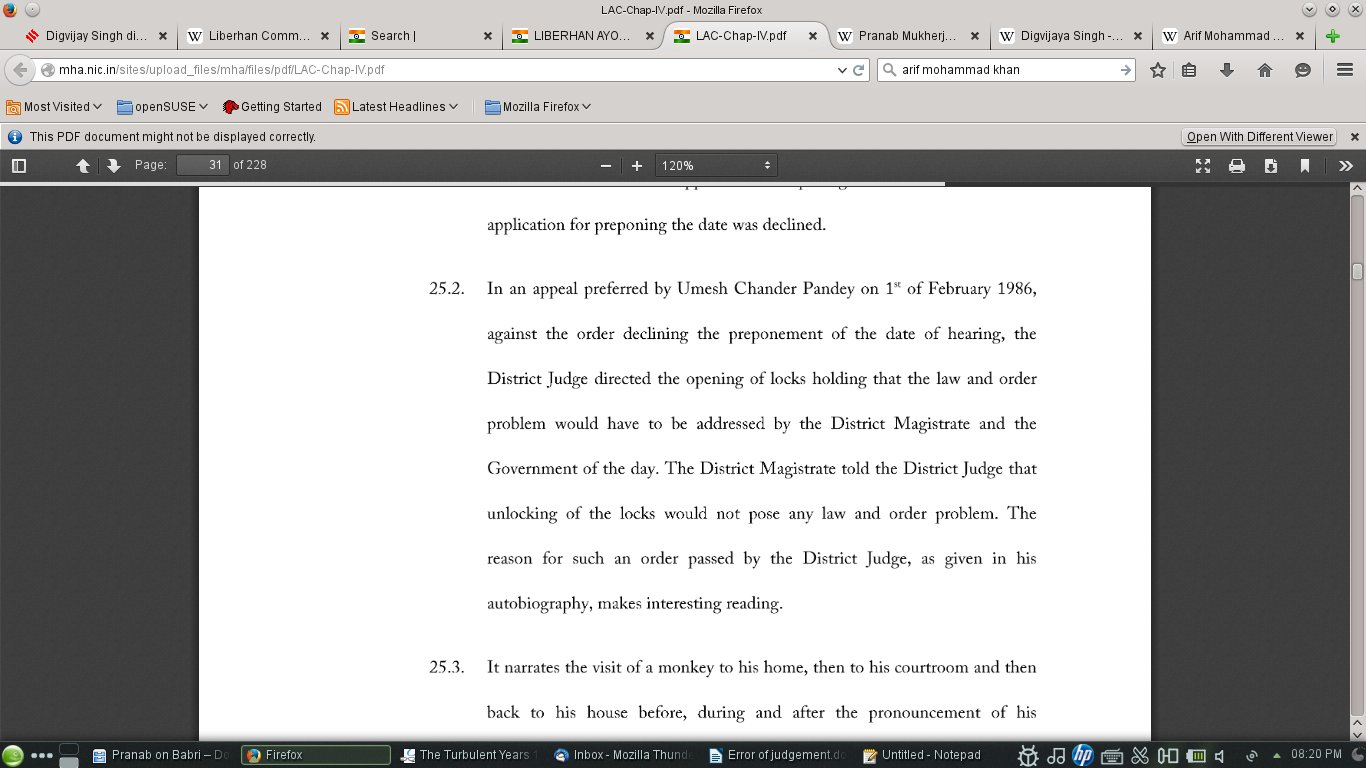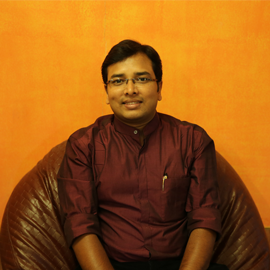Unlocking Babri: Pranab Mukherjee & Digvijaya Singh are both correct

The memoir
- In his memoir, President Pranab Mukherjee admits that Rajiv Gandhi erred in unlocking the Babri Masjid
- Digvijaya Singh contests this. He says it was the court\'s decision
The events
- Other sources indicate that while the decision was the court\'s, it was based on the govt\'s assurance
- Apparently the govt wanted to appease the Hindu community
More in the story
- Who is right, Pranab Mukherjee or Digvijaya Singh?
- Is Rajiv Gandhi to blame?
- What do the Liberhan Commission report and other independent accounts say?
It has often been claimed that in 1986, former prime minister Rajiv Gandhi wanted the doors of Babri Masjid to be unlocked so that Hindus could get a chance to worship the idol of Lord Ram that had mysteriously appeared inside the structure in 1949.
In possibly the first instance of validation of this claim by a senior Congress leader, President Pranab Mukherjee has written in his autobiography that the opening of the locks was "perhaps...an error of judgment".
In a section in Mukherjee's The Turbulent Years 1980-1996 where he talks about some of the former PM's failings, he writes, "The opening of the Ram Janmabhoomi temple site on 1 February 1986 was perhaps another error of judgment. People felt these actions could have been avoided."

The doesn't elaborate on this matter further.
However, Mukherjee's observation has now been contested by a senior Congress-man who has served the party for long. Congress General Secretary Digvijaya Singh told PTI in an interview that the locks were opened on a court's order, not Rajiv Gandhi's.
Opening the temple site was an error of judgment by Rajiv Gandhi, Mukherjee writes in his memoir
"Opening of the gate was not done by Rajiv Gandhi. It was a decision of the court," Singh reportedly said. However, he also noted that laying the foundation stone (at the temple site) could have been an "error of judgment (by Gandhi)".
Also read - Pranab Mukherjee slams Narasimha Rao for Babri, silent on Rajiv's mistakes in book
Liberhan Commission's report
Digvijaya is not entirely incorrect. The report of the Liberhan commission that inquired into the demolition of Babri Masjid did indeed say that it was the judge of the district court of Faizabad who had ordered the opening of the locks, on 1 February 1986. Interestingly, the report also said that while giving the order, the judge held that the law and order problem would have to be addressed by the District Magistrate and the government.

The reason for this clarification could have been, as the report notes, that it was the DM who had told the judge that "unlocking of the locks would not pose any law and order problem". This part of the report is worth noting, especially since after this, the report does not get into the intricacies of what made the DM give this undertaking. This aspect needed investigation because on such a sensitive law and order issue, a DM is usually unlikely to have an opinion independent from that of the government.
Had there been an immediate law and order problem, as eventually did happened in 1992, its repercussions would have been felt not just by the district administration but by the entire state and even the Centre. However, the Liberhan Commission did not go into the details of investigating what shaped the DM's statement and it remains a mystery.
Digvijaya Singh has contested Mukherjee's version. He says it was the court's decision, not Rajiv's
Independent reports
However, many independent reports have raised this point from time to time. A Wall Street Journal report from 2012 quotes former Congress leader Arif Mohammad Khan that Gandhi and Arun Nehru, his cousin and adviser, wanted to ensure that the petition to open the locks succeeded "so Hindus would feel assuaged". The prime minister asked Nehru to coordinate the government's participation in the case, including dealing with the state government of Uttar Pradesh," Khan reportedly told the journal.
The journal's report further adds that according to Khan, "the government ensured that two senior local officials appeared - unusually - before the judge and testified that law and order could be maintained if the lock was removed, a key consideration in the judge's deliberations."
Another report published in The Hindu in 2009 essentially lays down the same facts. The report says, "What Justice Liberhan left out of his narrative was any consideration of the role played by the Congress Chief Minister of Uttar Pradesh, Bir Bahadur Singh, and Rajiv Gandhi, who was the Prime Minister at the time."
In its report, the Liberhan Commission seems to have shielded Rajiv Gandhi from the blame
It also adds, "according to reports at the time, the Congress leadership, acting through Arun Nehru, ensured that the locks of the mosque were opened within an hour of the Faizabad judge's ruling. What is more, television cameras were on hand to record the triumphant entry of Hindu worshippers."
Mukherjee is yet to challenge his former colleague's assertion and, in all likelihood, he won't. Speaking at the book-launch, he had indicated that whatever was in the book was the most that he could have revealed and many other secrets of the party "will be buried" with him. However, Singh's act of contesting at least one of the views that he has voiced indicates that the book has ruffled some feathers in the Congress party.
Edited by Aditya Menon
More in Catch - December 6: Ram Mandir, a commitment or convenience for the BJP?
From Babri to Modi: How the demolition may have destroyed Advani's career
First published: 31 January 2016, 4:28 IST






![BJP's Kapil Mishra recreates Shankar Mahadevan’s ‘Breathless’ song to highlight Delhi pollution [WATCH] BJP's Kapil Mishra recreates Shankar Mahadevan’s ‘Breathless’ song to highlight Delhi pollution [WATCH]](https://images.catchnews.com/upload/2022/11/03/kapil-mishra_240884_300x172.png)

![Anupam Kher shares pictures of his toned body on 67th birthday [MUST SEE] Anupam Kher shares pictures of his toned body on 67th birthday [MUST SEE]](https://images.catchnews.com/upload/2022/03/07/Anupam_kher_231145_300x172.jpg)





_in_Assams_Dibrugarh_(Photo_257977_1600x1200.jpg)
